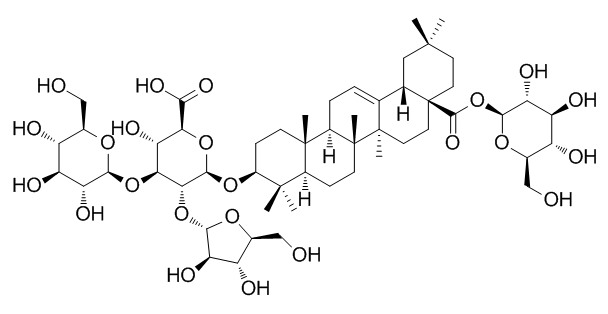Clematis heracleifolia
Clematis heracleifolia
1. The products in our compound library are selected from thousands of unique natural products; 2. It has the characteristics of diverse structure, diverse sources and wide coverage of activities; 3. Provide information on the activity of products from major journals, patents and research reports around the world, providing theoretical direction and research basis for further research and screening; 4. Free combination according to the type, source, target and disease of natural product; 5. The compound powder is placed in a covered tube and then discharged into a 10 x 10 cryostat; 6. Transport in ice pack or dry ice pack. Please store it at -20 °C as soon as possible after receiving the product, and use it as soon as possible after opening.
Natural products/compounds from Clematis heracleifolia
- Cat.No. Product Name CAS Number COA
-
BCN8806
Kalopanaxsaponin G171370-50-6
Instructions

Inhibitory effects of Korean plants on HIV-1 activities.[Pubmed: 11536375]
In the search for novel anti-human immunodeficiency virus type 1 (anti-HIV-1) agents from natural sources, 49 MeOH extracts of Korean plants were screened for their inhibitory effects against RNA-dependent DNA polymerase (RT) and ribonuclease H (RNase H) activities of HIV-1 reverse transcriptase and HIV-1 protease, and anti-HIV-1 activity. Regarding the HIV-1 reverse transcriptase, Agrimonia pilosa (whole plant), Cornus kousa (stem and leaf), Limonium tetragonum (root) and Mallotus japonicus (stem) showed significant inhibitory activity on RT activity with 50% inhibitory activity (IC(50)) of 8.9, 6.3, 7.5 and 11.9 microg/mL, respectively, whereas Agrimonia pilosa was also active against RNase H activity (IC(50) = 98.4 microg/mL). Four plants, namely Agrimonia pilosa (whole plant), Atractylodes japonica (root), Clematis heracleifolia (whole plant) and Syneilesis palmata (whole plant), were appreciably active (<35%) against recombinant HIV-1 protease at a concentration of 100 microg/mL. Crinum asiaticum var. japonicum (root) showed significant anti-HIV-1 activity (ED(50) = 12.5 microg/mL) with a favourable SI value of 16.


